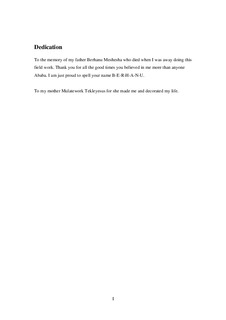| dc.contributor.author | Berhanu, Martha | nb_NO |
| dc.date.accessioned | 2014-12-19T14:25:31Z | |
| dc.date.available | 2014-12-19T14:25:31Z | |
| dc.date.created | 2007-06-18 | nb_NO |
| dc.date.issued | 2007 | nb_NO |
| dc.identifier | 122431 | nb_NO |
| dc.identifier.uri | http://hdl.handle.net/11250/265217 | |
| dc.description.abstract | This study is about the female labour migration to the Middle East. It aims to explore the causes of migration. It looks at the various motivations a migrant could have to decide to migrate to the Middle East. It also aims to see into the consequences migration has on the migrant and the household in general. In so doing the study looks at the migration – development link.
In this study the structuration theory is used together with other theories to explain the causes and impacts of migration. The study employs qualitative methods of research. Snowball, opportunistic and expert sampling methods were used to select twelve migrant returnees, three migrant families, three private employment agents and two representatives of IOM and MOLSA.
In-depth interview was the main method used to collect data. This document was produced based on construction of knowledge between interviewees and the researcher through in-depth interviews supported by secondary data.
The study revels that though it is not the poorest of the poor that migrate, often migrants are not satisfied with their individual or household income level. But motivations other than the income level including control of power and individual freedom of the migrant are seen to be important. As to the impact of migration the study shows that the appropriate use of remittance is a crucial factor for the successful migration concerning livelihood security. Depending on the background of the migrant the effect of remittance can be positive or negative. Migrants from economically unstable households suffer from unproductive consumption of remittance. In addition to this, migration has other positive and negative social and psychological consequences. Female migrant were seen to resist various factors to make the most out of migration. | nb_NO |
| dc.language | eng | nb_NO |
| dc.publisher | Fakultet for samfunnsvitenskap og teknologiledelse | nb_NO |
| dc.subject | Master of Philosophy in Development Studies, specialising in Geography | en_GB |
| dc.title | Looking back at migration: Female labour migration to the Middle East: The case of the returnees in Ethiopia | nb_NO |
| dc.type | Master thesis | nb_NO |
| dc.contributor.department | Norges teknisk-naturvitenskapelige universitet, Fakultet for samfunnsvitenskap og teknologiledelse, Geografisk institutt | nb_NO |
